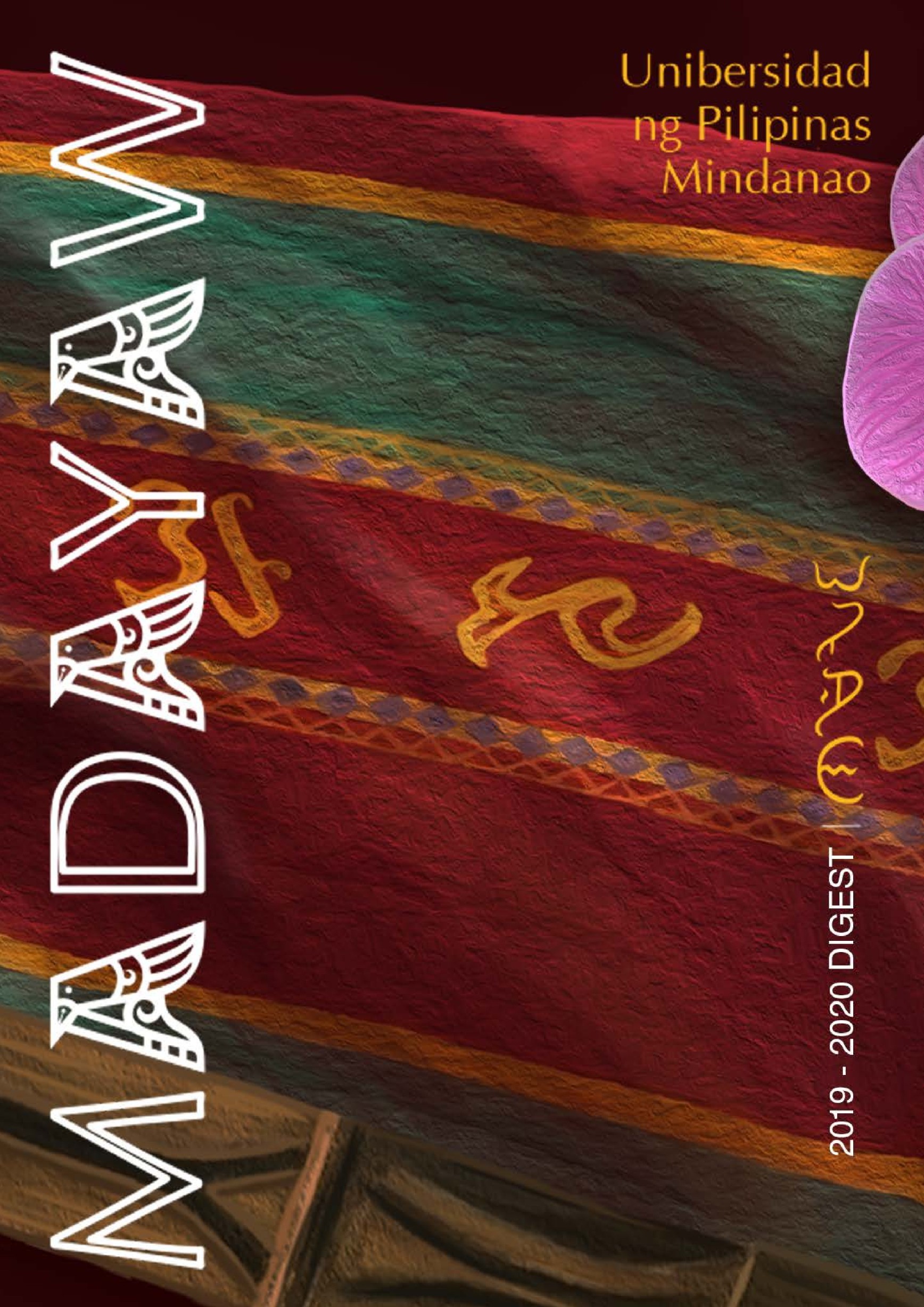HIGHLIGHTS
01 - 31 October 2020
MINDANAO COVID-19 SITUATIONER
Davao City, home of UP Mindanao, continued to be under Modified General Community Quarantine (MGCQ) from July to October 2020. Also, City Mayor Sara Duterte-Carpio issued Executive Order 55 re-imposing a 7 PM to 5 AM curfew, with exceptions, effective 15 October to 31 December 2020 to control the surge of COVID-19 cases
As of 31 October 2020, Mindanao had 22,585 cumulative cases, up from 13,085 as of 01 October 2020, up from 7,950 on 06 September 2020, and 4,516 on 10 August 2020.
Mindanao island suffered 585 deaths as of 31 October 2020, up from 319 as of 01 October 2020, 167 as of 06 September 2020, and 96 as of 10 August 2020.
The nation-wide total on 31 October 2020 was 378,933 cumulative cases, with 7,185 deaths, compared to 1 October 2020 with 311,694 cumulative cases and 5,504 deaths. (source: ncovtracker.doh.gov.ph)
COVID-19 INITIATIVES
Center for Applied Modeling, Data Analytics, and Bioinformatics for Decision-Support Systems in Health
UP Mindanao received a letter dated 08 October 2020 from DOST’s Undersecretary for Research and Development Rowena Cristina Guevara conveying approval for UP Mindanao’s proposed Niche Center in the Regions (NICER) program. The approval is subject to compliance with instructions, priority ranking, and availability of funds. The NICER program was renamed "Center for Applied Modeling, Data Analytics, and Bioinformatics for Decision-Support Systems in Health,” as advised by the DOST Executive Committee.
UP Mindanao’s NICER program will involve key regional and local institutions in its four component projects and the Philippine Genome Center Mindanao and UP Mindanao’s existing multi-disciplinary research. The NICER program is a key pillar in UP Mindanao’s Mindanao Health Initiatives that will include the proposed medical education program and a city hospital, in partnership with the Davao City Government.
At present, the NICER program will focus on the current pandemic, but it will also analyze other health-related data in the future. Mindanao will be the pilot area of the proposed program.
3rd Madayaw International Multidisciplinary Research Conference
UP Mindanao researchers presented ePosters and oral presentations at the 3rd Madayaw International Multidisciplinary Research Conference on the theme, “Shaping the future research emerging from this COVID-19 pandemic,” organized by the San Pedro College Research Publication Innovation Center held on 01-02 October 2020 in Davao City.
The Department of Mathematics, Physics & Computer Science (DMPCS) constituents presented the following ePosters:
- "Temporal projections of COVID-19 cases, deaths, and recoveries in Davao City, Philippines, using an Epidemic Model," presented by Ms. El Veena Rosero.
- "Investigating the role of a food ration system in controlling COVID-19 at barangay-level in Davao City using agent-based model simulation approach," presented by Ms. Ivy Grace Morales Panogalinog. [THIRD PLACE]
- "The irony of zero rabies reports: Are zeroes really zeroes?" presented by Mr. Zython Paul Lachica [SECOND PLACE]
- "QGIS-generated maps capturing the spatiotemporal distribution of COVID-19 cases among barangays in Davao City, Philippines" presented by Ms. Mia Kristine Quinco [FIRST PLACE]
Among the research co-authors were Mr. Abel Leandro Borja Paras, Ms. Elaine Mae Tibayan, Ms. Alaina Plaza, Ms. Kylah Catherine Nulada, Dr. Aurelio De Los Reyes, and Assoc. Prof. May Anne Mata (DMPCS).
The Department of Social Sciences (DSS) faculty members presented the following researches as oral presentations:
- “Banana Export Industry: Socio-Economic and Ecological Transformation,” presented by Asst. Prof. Theresa Mae Gallardo
- “Stress Inoculation Training (SIT) On State-Trait Anxiety of High-Stress Senior College Students,” presented by Asst. Prof. Rachelle Bersamin
- “Exploring Academic and Occupational Interest Aptitudes as Predictors of Academic Persistence: Basis for Attrition Intervention Program,” presented by Asst. Prof. Rachelle Bersamin
Lecture Series in Mathematical Biology
Dr. May Anne Mata (DMPCS) delivered the talk “A seven-month-long journey to Covid-19 modeling, simulations, game development, and beyond,” in the Lecture Series in Mathematical Biology: Insights from Equations; Mathematical Techniques for Outbreaks, organized by the Mindanao State University-Iligan Institute of Technology on 17 October 2020.
Sibya Media Production Unit
BACMA Sibya, the homegrown media production unit of the BA Communication and Media Arts program, produced an infographic version of the “UP Mindanao Health and Safety Guidelines during the Public Health Emergency” as part of the unit's pioneering projects. The infographics were based on UP Mindanao Memoranda Nos. LND-2020-052 dated 14 May 2020 and LND-2020-054 dated 17 May 2020. The team disseminated the materials on social media, UP Mindanao’s official Facebook and Twitter pages, on 05 October 2020.
BACMA Sibya Media Production Unit produced new infographics titled “Frequently Asked Questions on COVID-19” on 26 October 2020, based on the UP Mindanao Executive Committee's pamphlet. The team, likewise, posted the infographics on the UP Mindanao social media pages. BACMA Sibya is headed by Mr. Samuelle Marionne Sanchez, an Instructor under the Department of Humanities.
KNOWLEDGE CREATION AND PUBLIC SERVICE
Publications
Associate Professor Jhoanna Lynn Cruz (Department of Humanities) announced the release of her book, "Abi Nako, or So I Thought," by UP Press on 25 October 2020. "It revolves around my first ten years of rebuilding my work-in-progress-life in Davao," she said. The book is available in online resellers Lazada and Shopee.
In Press:
“Postharvest Quality of ‘Carabao’ Mango as Affected by Spun-bound Bagging Materials,” by Leizel B. Secretaria, Emma Ruth Bayogan (Department of Biological Science & Environmental Studies [DBSES]), CS Lubaton, AG Notarte, and Jenny H. Ekman. 2021. Chiang Mai University Journal of Natural Sciences. Vol 20 No. 1.
The following papers were accepted for publication in international/national peer-reviewed journals and publications:
- “Seasonal Change, Fishing Revenues, and Nutrient Intakes of Fishers’ Children in Davao Gulf, Philippines” by Chino M. Joquiño, Jon Marx P. Sarmiento (School of Management [SOM]), Leo Manuel B. Estaña (Department of Mathematics, Physics & Computer Science), Cleto L. Nañola, Jr (DBSES), and Pedro A. Alviola IV (SOM) was accepted for publication in the Philippine Journal of Science.
- “The Extent of Technological Innovation Adoption among Micro, Small and Medium Food Processing Enterprises and its Effects on Poverty Reduction” by Kenneth Barroga, Agnes Rola, Dinah Pura Depositario, and Larry Digal (SOM) was accepted for publication in the International Journal of Entrepreneurship and Small Business.
- “Hullubaton: Pagtatagpi-tagpi ng Dawot ng Mga Mandaya. ‘Mga Pag-aaral sa Epikong-Bayan ng Filipinas: Tradisyon, Lipunan, Inobasyon,’" by Genevieve J. Quintero was accepted for publication in the Philippine Epic Project, National Commission for Culture and the Arts.
- “Being Woman: Depiction of Women in Three Blaan Folktales. ‘Tinipong Tinig Ng Kababaihan, Priestess to Presidents,’" by Genevieve J. Quintero was accepted for publication by the UP Press.
Davao Reads Amado Hernandez
UP Mindanao faculty members were panelists in "Davao reads Amado Hernandez," the second part of the National Artists Series, which featured National Artist for Literature Amado V. Hernandez's works, held online on 02 October 2020.
Associate Professor Jhoanna Lynn B. Cruz of the Department of Humanities (DH) and Senior Lecturer Lualhati Milan Abreu of the Department of Social Sciences (DSS) were panelists, and Assoc. Prof. John Bengan (DH) served as Coordinator and Reader. The Keynote Speaker was Dr. Virgilio S. Almario, National Artist for Literature. The National Commission on Culture and the Arts organized the event as part of the continuing Literary Month celebration.
Mindanao-wide Webinar on Omics Research. Theme: Moving Past Pandemics
Philippine Genome Center Mindanao organized the Mindanao-wide Webinar on Omics Research with the Theme: Moving Past Pandemics throughout October 2020. The webinar had four sessions.
“Omics in Agriculture” was held on 09 October 2020 with Dr. Glenn Gregorio and Dr. Lynn Esther Rallos as resource speakers
“Omics in Food” was on 16 October 2020 with Dr. Mary Ann Torio and Mr. Jacus Nacis
“Omics in Health” was on 23 October 2020, had Dr. Gloria Despacio-Reyes and Dr. Aleyla E. De Cadiz (Dept. of Biological Science and Environmental Studies) as resource speakers
“Omics in Diagnostics” was on 28 October 2020 with Dr. Angelo Josue Lubag and Dr. Clarissa Yvonne Domingo
Online forum and consultation on “Bridging the Health Care Gaps In Mindanao”
UP Mindanao hosted the online forum and consultation on “Bridging the Health Care Gaps In Mindanao" on 14 October 2020 for some 96 or more public health personnel, guests, and university constituents who attended through the teleconferencing and social media platforms. Chancellor Larry Digal provided the background and rationale for the forum as part of the plan to establish a UP Mindanao College of Medicine.
Dr. Ramon Pedro Paterno, former DOH secretary Dr. Paulynn Ubial, DOH-Region XI director Dr. Annabelle Yumang, and Dr. Teodoro Herbosa spoke on the various aspects and gaps in the Philippines health care system. Health workers in the audience had their chance to give inputs in two parallel break-out sessions.
Vice-Chancellor for Academic Affairs Nilo Oponda said the forum output would feed into the succeeding forums and workshops on the curricular templates and facility requirements and the identification of resources to establish the College of Medicine.
Lecture Series on Anthropological Methods
The Department of Social Sciences hosted a Lecture Series on Anthropological Methods in October-November 2020 via the Zoom platform. Prof. Ramon “Bomen” Guillermo gave a talk on “Ang Salita sa Mata ng Makina: Digital na Humanidades at ang Penomenolohiya ng Pagbabasa” on 28 October 2020 where he explained key Filipino concepts conveyed through words and writing in old Filipino literary works. On 29 October 2020, anthropologist Skilty Labastilla of Ateneo de Manila delivered a lecture on “Applied Anthropology Research in COVID times: Strategies and Ethical Considerations.” Professors Andrea Malaya Ragragio and Myfel Joseph Paluga, both of the Dept. of Social Sciences and Leiden University, are scheduled on 04 November 2020.
Indigeneity, Identity, and Empowerment
Asst. Prof. Andrea Malaya Ragragio of the Department of Social Sciences was a panelist in "Panel 7: Indigeneity, Identity, and Empowerment," organized by the University of California Los Angeles, on how Indigenous groups in the Philippines and Taiwan have instituted programs to define their ethnic identity to the larger society. The event, converted to Philippine Standard Time, was on 29 October 2020, Thursday, 10 AM.
Philippine Queer Studies Conference 2020
Researchers presented papers in the Philippine Queer Studies Conference 2020, organized by the UP Center for Women’s and Gender Studies, UP Babaylan, and the Psychological Association of the Philippines LGBT Psychology Special Interest Group, in partnership with the UP Diliman Department of Sociology, held online on 26-28 October 2020:
- “Leavetaking and Homecoming: When a Catholic Lesbian Writes,” presented by Assoc. Prof. Jhoanna Lynn B. Cruz (DH)
- “Pagka-lesbiana: Lesbian Writing as a Space of Becoming,” presented by Assoc. Prof. Jhoanna Lynn B. Cruz
- “Aging in the Narratives of Older/Tiguwang Lesbians in Davao City, Mindanao,” presented by Assoc. Prof. Raymundo R. Pavo (DSS)
- “Higit sa Boys Love: Pagsuri at Pagtalakay sa Imahe ng Bakla sa mga Boys Love Series,” presented by Ray Mart M. Lapiña (BS Anthropology)
PAGSUBANG: DUGONG-Antro Sem Starter Lecture Series
The Department of Social Sciences organized the “Pagsubang: DUGONG-Antro Sem Starter Lecture Series” featuring talks by faculty members on the topics:
- “Antropolohiya sa Malapitan: Ambag at Kahalagahan ng Antropolohiya,” by Asst. Prof. Kenette Jean Millondaga, 10 October 2020
- “Biological Anthropology - Lessons from the Field: Biological Anthropology and the Pandemic,” by Prof. Richard Jonathan O. Taduran, 17 October 2020
- “Linguistic Anthropology: Sulyap sa Kalagayan ng mga Wikang Rehiyunal,“ by Asst. Prof. Janus Ruel Cabazares, 24 October 2020
- “Archaeology - Survey of Archaeology in Mindanao: Challenges and Opportunities” by Asst. Prof. Andrea Malaya Ragragio, 31 October 2020
Radyo Iskolar
Radyo Iskolar, the homegrown online radio station of the BA Communication and Media Arts program, returned to broadcasting on 28 October 2020 onward on the platform https://mixlr.com/radyo_iskolar. The new lineup of shows is: “Balitang Iskolar” Cebuano-language news, “Gabay Tambayan” edutainment talk show, “Replay 2K” music program, “Iskoming Out” radio magazine, and “Taralets” music show. The program adviser is Ms. Merle Dawn Comidoy, an Instructor of the Department of Humanities.
3rd DOST-PCAARRD Intellectual Property Master Class
Ms. Lynda Buenaobra, Chief Administrative Officer, and Ms. Dyle Legaspi, Research Associate, both of the UP Mindanao Technology Transfer and Business Development Office, completed the 3rd DOST-PCAARRD Intellectual Property Master Class that was conducted online nationwide from 06 July to 23 October 2020. Ms. Buenaobra completed the Non-Chemical/Mechanical Patenting while Ms. Legaspi completed the Chemical Patenting and earned distinction as “Mock Exam Topnotcher in Chemical Patenting.” The Virtual Commencement Exercises held on 23 October 2020 had DOST Secretary Fortunato de la Peña, IPOPhil Director-General Rowel Barba, DOST Undersecretary Rowena Cristina Guevara, and DOST-PCAARRD Executive Director Reynaldo Ebora as speakers.
Meryl Williams Fellowship
Asst. Prof. Glory Dee Romo (SOM) was accepted to the Meryl Williams Fellowship, funded by the Australian Centre for International Agricultural Research (ACIAR). It is a 15-month program that will start in late February 2021. The Fellowship's key goal is to enhance participant’s leadership skills and increase their impact through a combination of immersive learning, mentoring, networking, and professional development. The University of England will deliver the program on behalf of ACIAR, with Coffey International Development providing administrative support.
National Research Council of the Phils.
Asst. Prof. Kriza Faye Calumba (Department of Food Science and Chemistry (DFSC) was inducted as an associate member of the National Research Council of the Philippines during the Annual Scientific Conference and 18th General Membership Assembly of the NRCP Mindanao Regional Cluster on 30 October 2020.
Land Reservations
In the UP Laak Land Reservation, located in Davao de Oro Province, the season-long Training on Sustainable Vegetable Production continued in Special Barangay Talle, Laak. Session 4 on Plant Nutrition was held on 08 October 2020, and Session 5 on Integrated Pest Management was on 22 October 2020. The trainings are co-organized by the Talle Barangay Council with Talle Farmers Association as beneficiary. Project partner Compostela Valley State College (CVSC) provided the resource persons. Thirty persons (16 males and 14 females), 12 of whom are DSWD beneficiaries, participated in both sessions.
In the UP Marilog Land Reservation in upland Davao City, the Obu Manuvu tribespeople took the Livelihood Training on Beads-Making on 09 October 2020. The training objectives are to protect and promote the tribe’s Living Tradition and provide alternative livelihood to the tribespeople. A total of 16 males and 15 females participated, of which 7 were also DSWD beneficiaries.
The memorandum of understanding between UP Mindanao and Compostela Valley State College was signed by all parties and is ready for transmittal to the UP Board of Regents. The general objective of the MOU is to explore areas of cooperation between UP Mindanao and Compostela Valley State College in various public service undertakings in, among others, the UP Laak Land Reservation, that will create synergy and mutual benefit for both parties arising from each party’s resources, expertise, and experience in agricultural production and extension.
INTERNATIONALIZATION
BA Architecture students’ work was among the entries selected to represent the Philippines in an international architectural design competition, as reported by the United Architects of the Philippines Commission on Education on 18 October 2020. "Galton de Oro: Dynamic Micro Markets of the Future: A Re-design of the CDO Public Market" by BS Architecture graduate John Bebelone and students Bryan Steven Borja and Marvin Mahinay was among the three entries selected to represent the Philippines in the ARCASIA Students Architectural Design Competition 2020. The announcement of the international competition result is on 02 November 2020.
OPTIMIZE USE OF RESOURCES / PROMOTE ACCESS AND DIVERSITY
Consultation on draft Campus Master Development Plan
A consultation on the draft Campus Master Development Plan was held on 06 October 2020 for UP Mindanao constituents via the Zoom teleconference application. The Campus Planning and Development Office presented the 96-page draft plan. Opinions and feedback were gathered during the consultation and through survey sheets after the event. The Plan was again presented in a consultation for the alumni and external stakeholders on 09 October 2020.
Consultation on Proposed Arts and Culture Hub
On 12 October 2020, the Department of Tourism - Region XI (DOT-XI) and UP Mindanao organized another town hall consultation for a proposed Arts and Culture Hub building and activity center that DOT-XI hopes to erect within the UP Mindanao campus. The project is a joint initiative of the DOT-XI and the National Commission for Culture and the Arts (NCCA). DOT-XI Regional Director Tanya Rabat-Tan and her team presented the physical, financial, and activity plans to internal and external stakeholders of UP Mindanao. Chancellor Larry Digal gave his review of the DOT-XI areas of activity that could fit UP Mindanao’s mandates and programs, namely, cultural village development, schools of living tradition, heritage education, heritage management, and creative industries. The DOST-XI director, Dr. Sales, suggested that the project look beyond the Davao region to the entire Mindanao and be part of an ecosystem of Mindanao cultural and social science networks.
WELFARE OF CONSTITUENTS
In collaboration with the Human Resource Development Office, Information Technology Office, and Ugnayan ng Pahinungod, the Office of Student Affairs organized a webinar for employees and students on 29 October 2020 via the Zoom teleconferencing app. The webinar “Keeping Mental Health In-check: Ginhawa (well-being) in the New Normal’’ had UP Diliman professor emeritus Dr. Violeta V. Bautista as resource person.
UP ALUMNI ASSOCIATION DAVAO
The UP Alumni Association Davao Chapter held its Induction of Officers on 10 October 2020 in a resort in Davao City. Alumni Regent Reynaldo Laserna administered the Oath of Office to the officers via the Zoom teleconference app. Mr. Napoleon Concepcion (right-most) and Mr. Sherwin Ramos (center) were inducted as chairperson and president, respectively. Chancellor Digal is an ex-officio director of the UPAA-Davao.
UP Mindanao in the News
- 30 September 2020 COVID-19 Test Facility Completed In Davao Regional Medical Center,” Radio Philippines Network, Inc. https://bit.ly/3lq2PJ2
- 30 October 2020 “UPMin hosts webinars on digital economy, food security,” SunStar Davao, https://bit.ly/3ko6V3r
- 30 October 2020 “Filipina architect for culture and heritage,” SunStar Davao, https://bit.ly/2IcXqah
- 30 October 2020 “UP Mindanao webinars on the digital economy, agriculture, and food,” UP System website, https://bit.ly/35d5mkb
- 28 October 2020 “Future of Anthropology Panel 7: Indigeneity, Identity, and Empowerment,” UCLA Asia Pacific Center, https://www.international.ucla.edu/apc/event/14594
- 21 October 2020 “Work, business, or side hustle?” SunStarDavao, https://bit.ly/3keUlmV
- 14 October 2020 “UP Mindanao hosts an online forum with health officers,” UP Twitter, https://bit.ly/2IoPx1f
- 04 October 2020 “No Davao City barangay under 'very high risk' since Sept. 11,” SunStar Davao,https://bit.ly/35gieGp
- 01 October 2020 “September Covid-19 cases in Davao City below UP projections,” SunStar Davao, https://bit.ly/2GJJcg4
- 30 September 2020 “COVID-19 Test Facility Completed In Davao Regional Medical Center,” RPN Radio, https://bit.ly/2Il5Goy
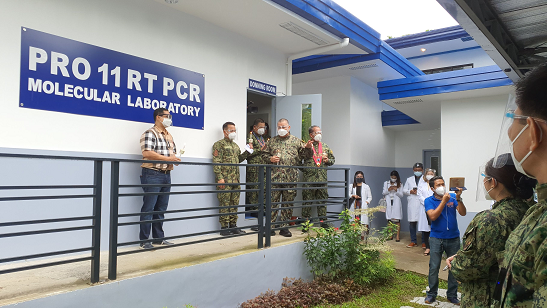
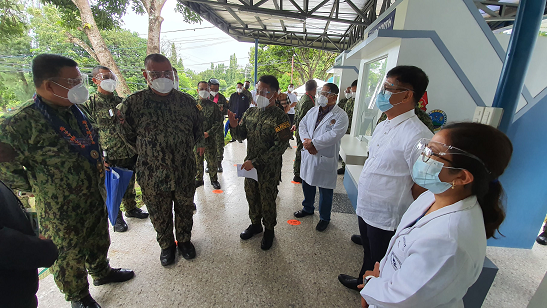

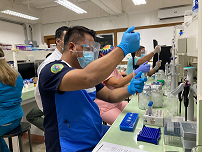 The Philippine Genome Center (PGC) Mindanao is part of the UP TRAINS program, which assists the Department of Health in COVID-19 frontliner training with the UP National Institutes of Health (NIH) and Philippine Genome Center (PGC) as the training arms. Recently, PGC Mindanao trained frontliners from the Mayor Hilarion A. Ramiro Sr. Medical Center in Ozamiz City, Misamis Occidental, from the Phil. Red Cross Misamis Oriental-Cagayan de Oro Chapter, and from the Adela Serra Ty Memorial Medical Center in Tandag City, Surigao del Sur.
The Philippine Genome Center (PGC) Mindanao is part of the UP TRAINS program, which assists the Department of Health in COVID-19 frontliner training with the UP National Institutes of Health (NIH) and Philippine Genome Center (PGC) as the training arms. Recently, PGC Mindanao trained frontliners from the Mayor Hilarion A. Ramiro Sr. Medical Center in Ozamiz City, Misamis Occidental, from the Phil. Red Cross Misamis Oriental-Cagayan de Oro Chapter, and from the Adela Serra Ty Memorial Medical Center in Tandag City, Surigao del Sur. 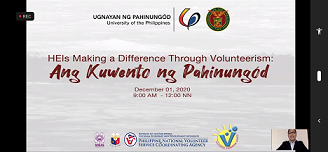 The UP Mindanao Ugnayan ng Pahinungod participated in the National Volunteer Month kick-off event “Mga Kwento ng Pahinungod,” held online on 01 December 2020. President Danilo Concepcion had revived the Pahinungod in May 2019 and Ugnayan ng Pahinungod System Director Dr. Grace Aguiling-Dalisay gave a two-year update report. Dr. Emil Q. Javier, Pahinungod founder and event keynote speaker, recalled the establishment of Kidawa high school in present-day Davao de Oro, which was testified by community partner Dr. Norman Jandog, the former school principal. Mr. Michael Gatela, former Kidawa high school volunteer and present UP Mindanao Pahinungod director, gave the closing remarks, saying, “Makibahagi At Maglingkod! Ituloy Ang Kwento Ng Pahinungod! Ipagpatuloy Ang Kwento Ng Boluntarismo!”
The UP Mindanao Ugnayan ng Pahinungod participated in the National Volunteer Month kick-off event “Mga Kwento ng Pahinungod,” held online on 01 December 2020. President Danilo Concepcion had revived the Pahinungod in May 2019 and Ugnayan ng Pahinungod System Director Dr. Grace Aguiling-Dalisay gave a two-year update report. Dr. Emil Q. Javier, Pahinungod founder and event keynote speaker, recalled the establishment of Kidawa high school in present-day Davao de Oro, which was testified by community partner Dr. Norman Jandog, the former school principal. Mr. Michael Gatela, former Kidawa high school volunteer and present UP Mindanao Pahinungod director, gave the closing remarks, saying, “Makibahagi At Maglingkod! Ituloy Ang Kwento Ng Pahinungod! Ipagpatuloy Ang Kwento Ng Boluntarismo!” The Department of Human Kinetics (DHK) organized the Forum on the Proposed Associate in Arts Sports Studies and Bachelor of Sports Science Degree on 05 December 2020 to prepare to offer these programs in Academic Year 2021 – 2022. Sports personalities from the city government, the secondary schools, and SEA Games athlete and UP Mindanao alumna Mary Pauline Fornea shared experiences and gave updates on sports developments from their respective sectors.
The Department of Human Kinetics (DHK) organized the Forum on the Proposed Associate in Arts Sports Studies and Bachelor of Sports Science Degree on 05 December 2020 to prepare to offer these programs in Academic Year 2021 – 2022. Sports personalities from the city government, the secondary schools, and SEA Games athlete and UP Mindanao alumna Mary Pauline Fornea shared experiences and gave updates on sports developments from their respective sectors.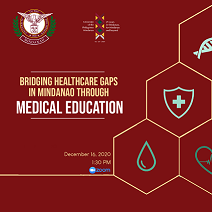 UP Mindanao organized a second forum on the health care gaps in Mindanao on 16 December 2020. The online forum “Bridging the Health Care Gaps in Mindanao through Medical Education” discussed the elements of a prospective curriculum for a proposed UP Mindanao College of Medicine that fits the health needs of Mindanao. UP Executive Vice President Teodoro Herbosa, MD, a medical advisor of the National Task Force on COVID-19, gave an inspirational message. The resource speakers were Dean Cenon Alfonso of the Ateneo de Manila University School of Medicine, Dean Filedito Tandinco of the UP Manila School of Health Sciences, Dean Charlotte Chiong of UP College of Medicine, and Dr. Cristina Achacoso, former dean of the Mindanao State University College of Medicine. Participants to the forum were Provincial Health Officers, City Health Officers, and Municipal Health Officers of Regions XI and XII, UP Mindanao alumni, and partners.
UP Mindanao organized a second forum on the health care gaps in Mindanao on 16 December 2020. The online forum “Bridging the Health Care Gaps in Mindanao through Medical Education” discussed the elements of a prospective curriculum for a proposed UP Mindanao College of Medicine that fits the health needs of Mindanao. UP Executive Vice President Teodoro Herbosa, MD, a medical advisor of the National Task Force on COVID-19, gave an inspirational message. The resource speakers were Dean Cenon Alfonso of the Ateneo de Manila University School of Medicine, Dean Filedito Tandinco of the UP Manila School of Health Sciences, Dean Charlotte Chiong of UP College of Medicine, and Dr. Cristina Achacoso, former dean of the Mindanao State University College of Medicine. Participants to the forum were Provincial Health Officers, City Health Officers, and Municipal Health Officers of Regions XI and XII, UP Mindanao alumni, and partners.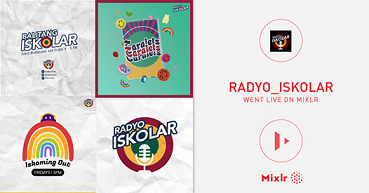 Radyo Iskolar, an online radio project of BA Communication and Media Arts (BACMA) students under adviser Ms. Merle Dawn Comidoy-Acol of the Humanities department, produced a series of radio documentaries on Filipino realities during the COVID19 pandemic. These were aired on 16 and 18 December 2020 via
Radyo Iskolar, an online radio project of BA Communication and Media Arts (BACMA) students under adviser Ms. Merle Dawn Comidoy-Acol of the Humanities department, produced a series of radio documentaries on Filipino realities during the COVID19 pandemic. These were aired on 16 and 18 December 2020 via 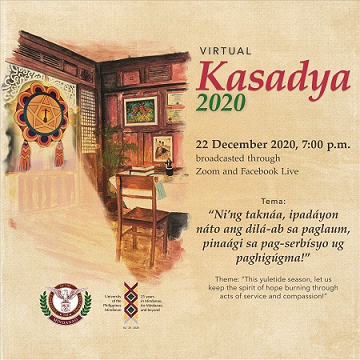 The Virtual Kasadya 2020, Christmas celebration for students and staff, was held on 22 December 2020 on the theme, "Ni’ng taknáa, ipadáyon náto ang diláab sa pagláum, pinaági sa pag-serbísyo ug pag-higúgma!" (“This yuletide season let us keep the spirit of hope burning through acts of service and compassion!”). The virtual event was a substitute for the traditional annual Christmas lantern parade. The graphic design was created by BACMA students Marriel Gamaya and Maryll Delposo.
The Virtual Kasadya 2020, Christmas celebration for students and staff, was held on 22 December 2020 on the theme, "Ni’ng taknáa, ipadáyon náto ang diláab sa pagláum, pinaági sa pag-serbísyo ug pag-higúgma!" (“This yuletide season let us keep the spirit of hope burning through acts of service and compassion!”). The virtual event was a substitute for the traditional annual Christmas lantern parade. The graphic design was created by BACMA students Marriel Gamaya and Maryll Delposo.